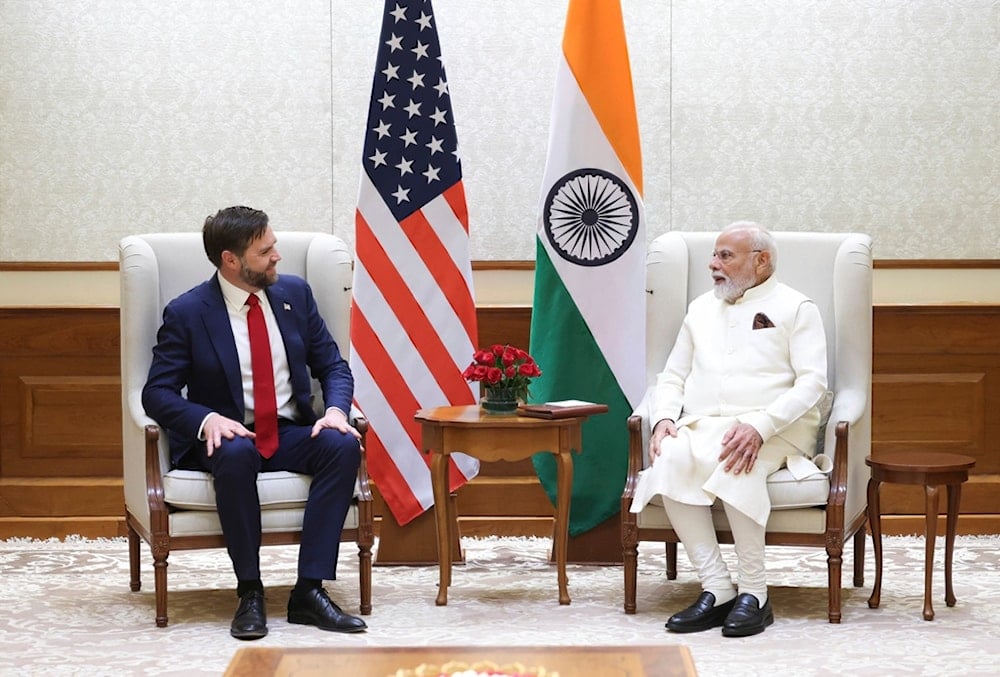Trump 50% tariffs on Indian exports take effect, straining trade ties
Trump’s 50% tariffs hit exporters and jobs hard after failed talks with New Delhi, raising concerns over US-India ties.
-

US Vice President JD Vance talks with Indian Prime Minister Narendra Modi during a meeting in New Delhi, India, Monday, April 21, 2025. (AP)
US President Donald Trump’s decision to double tariffs on Indian exports has come into effect, marking one of the sharpest trade escalations between the two strategic partners in recent years.
The new measures, which took effect at midnight Wednesday, lift duties on many Indian goods to as high as 50%. They combine a previous 25% tariff imposed on Indian products with an additional 25% penalty linked to New Delhi’s continued purchases of Russian oil. A wide range of goods is affected, including textiles, footwear, and leather, as well as gems, jewelry, chemicals, furniture, and sporting goods.
Exporters, jobs under pressure
The hike is expected to hit small and medium-sized exporters the hardest, particularly in Prime Minister Narendra Modi’s home state of Gujarat. Exporter groups estimate that more than half of India’s $87 billion in annual merchandise exports to the US will now face higher duties, leaving Indian producers at a 30–35% cost disadvantage compared with competitors in Vietnam, Bangladesh, and China.
“The move will disrupt Indian exports to the largest export market,” warned S.C. Ralhan, president of the Federation of Indian Export Organisations. He urged the government to cushion the blow by offering low-cost credit, easier access to loans, and even a one-year moratorium on bank repayments for struggling exporters.
An official at India’s Commerce Ministry, speaking anonymously, said the government plans to support affected exporters with financial aid and push them to expand into alternative markets, including China, Latin America, and West Asia.
Negotiations collapse after five rounds
The tariffs follow five unsuccessful rounds of trade talks between Washington and New Delhi. Indian negotiators had pressed for a cap at 15%, similar to rates enjoyed by US partners such as Japan, South Korea, and the European Union. However, those hopes collapsed when White House trade adviser Peter Navarro confirmed on Tuesday evening that the full 50% rate would proceed.
Analysts say political missteps and poor communication contributed to the breakdown in talks. The stakes are significant: bilateral goods trade reached $129 billion in 2024, according to US Census Bureau data, but Washington still ran a $45.8 billion deficit with India.
A US Customs and Border Protection notice offered a narrow grace period. Goods shipped from India before the deadline will still be allowed into the US under the previous lower tariffs if they arrive before September 17.
Certain products, including steel, aluminum, passenger vehicles, copper, and derivative goods, remain covered by separate Section 232 tariffs of up to 50% under US national security provisions and are unaffected by the new measures.
Impact on India’s manufacturing ambitions
Economists warn that the sustained tariff pressure could slow India’s rise as a global manufacturing hub competing with China, especially in electronics and smartphones.
Rajeswari Sengupta, an economics professor at Mumbai’s Indira Gandhi Institute of Development Research, said a weaker rupee might provide temporary relief. “Allowing the currency to depreciate is one way to provide indirect support to exporters and help offset the competitiveness gap.”
The tariff clash has raised fresh doubts about the broader US-India relationship, despite both nations portraying themselves as security partners with shared concerns about China.
Just a day before the tariffs took effect, the US State Department and India’s Ministry of External Affairs issued parallel statements highlighting a virtual meeting between senior officials. Both sides pledged to “enhance the breadth and depth of the bilateral relationship” and reaffirmed their commitment to the Quad alliance, which includes Australia and Japan.
India scales back Russian crude imports
Bloomberg reported on Tuesday that India's refiners are preparing to scale back purchases of Russian crude, a limited adjustment aimed at easing US pressure while keeping intact the country's energy partnership with Moscow.
Both state-owned and private processors, including Reliance Industries Ltd., are expected to reduce purchases to between 1.4 million and 1.6 million barrels per day beginning with October shipments, down from an average of 1.8 million barrels daily in the first half of the year, according to people familiar with the matter.
The Trump administration has directly tied the issue to Washington's trade deficit with India and announced that tariffs on Indian imports will double to 50% starting Wednesday. The move comes alongside harsher US rhetoric that revenues from India's Russian crude purchases fuel Moscow's war effort in Ukraine.

 5 Min Read
5 Min Read








